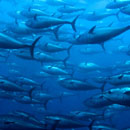Mother's fish, mercury intake tied to kids' ADHD risk
Reuters
Tue October 9, 2012
Children's risk of developing attention-deficit/hyperactivity disorder (ADHD) later in life may be tied to how much fish their mothers ate while pregnant, according to a US study.
Researchers writing in the Archives of Pediatrics & Adolescent Medicine found that eating at least two servings of fish per week was linked to about a 60 percent lower risk of kids developing certain ADHD-like symptoms.
But elevated mercury levels, which can also come from eating more fish - depending on the fish - were tied to a higher risk of developing the symptoms, such as hyperactivity, impulsiveness and inattentiveness.
Though the study did not prove cause and effect, and did not use a formal diagnosis of ADHD, it may offer insights into a condition that's estimated to have an impact on one in 10 children in the United States, researchers say.
"The really important message is to eat fish," said Sharon Sagiv, the study's lead author from the Boston University School of Public Health.
"Just stay away from mercury-containing fish, because these protective effects are pretty important."
Sagiv said it's best to stay away from "big fishes," such as tuna and swordfish, which typically contain the most mercury. Instead, stick to fishes such as haddock and salmon.
Past studies looking at the link between mercury and ADHD have produced conflicting results.
For the new study, the researchers followed 788 children who were born near New Bedford, Massachusetts, between 1993 and 1998. They used hair samples taken from the mothers right after delivery to test their mercury levels, and food diaries to see how much fish they ate.
Then, once the children were about 8 years old, the researchers asked their teachers to evaluate the kids' behaviors to see how many exhibited ADHD-like symptoms.
After taking all of the information into account, the researchers found 1 microgram of mercury per gram of a mother's hair - about eight times the average levels found in similar women's hair in another analysis - was tied to about a 60 percent increase in the risk of their child exhibiting ADHD-like behaviors.
But there was no link below 1 microgram of mercury per gram of a mother's hair.
Sagiv added that the negative effects from lower levels of mercury may be canceled out by the benefits from eating fish. The children appeared to be 60 percent less likely to exhibit impulsive or hyperactive behaviors if their mothers ate two or more servings of fish per week.
That finding conflicts with the U.S. government's recommendation that says pregnant women should eat no more than two six-ounce servings of fish per week to limit their exposure to mercury.
"I think it does call into question those guidelines, but this is only one study and the results should be confirmed," Sagiv told Reuters health.
In an editorial that appeared with the study, Bruce Lanphear at Simon Fraser University in Vancouver, echoed Sagiv's advice on avoiding "big fishes."
In the long term, we have to really find ways to fight contamination levels in fish so years from now we don't have to give this advice," he added.





 Share your thoughts in the Forum
Share your thoughts in the Forum
